Stop Your Dog From Itching!
Dr. Marty Becker, America's Veterinarian
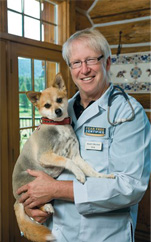 Spring is finally here, but the bad news is that so are allergies for our dogs. But, there's good news in that there are two new medicines to help.
Spring is finally here, but the bad news is that so are allergies for our dogs. But, there's good news in that there are two new medicines to help.
Dr. Marty is excited as a veterinarian about these two new medicines, because he knows that skin problems are the number one reason people take their dogs to the vet.
When humans get allergies, we sneeze and sniffle and have red runny eyes. But when dogs inhale something, it starts an itch cycle over their bodies. They will then tear open their skin by chewing and scratching, possibly resulting in bacteria and fungal infections. For most pets this is a forever disease.
One of these products actually came out in January 2015. Apoquel was a pill you gave your dog everyday to break the itch cycle. They originally thought they had a 3-year supply, but it was gone so quickly, most people couldn't get it. It is now back in stock and available to everyone. In fact, more than 2 millions dogs have used Apoquel. The good thing about Apoquel is that it works very quickly - with no side affects!
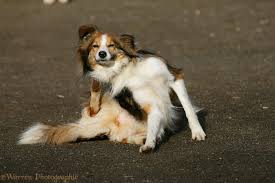 The other new product is Cytopoint. Cytopoint targets the specific protein that induces itching in a dog and gets rid of it also with no side affects. Cytopoint is an injectable that lasts 4 to 8 weeks, but some dogs can go even longer than that.
The other new product is Cytopoint. Cytopoint targets the specific protein that induces itching in a dog and gets rid of it also with no side affects. Cytopoint is an injectable that lasts 4 to 8 weeks, but some dogs can go even longer than that.
All veterinarians in North America now have two powerful anti-itching tools as their disposal that are simple and safe with no side affects, so don't let your dogs suffer.
Visit Website
Why Am I Here? Look To Your Dog For The Answers
Sanjay Gupya, Perceiving Purpose
 Sanjay Gupta is our guest this week. He says he learned more from his dog than he did during 25 years of Philosophy education. His dog's insights clarify what really is important in life. Sanjay will share the most poignant message his Basset Hound taught him.
Sanjay Gupta is our guest this week. He says he learned more from his dog than he did during 25 years of Philosophy education. His dog's insights clarify what really is important in life. Sanjay will share the most poignant message his Basset Hound taught him.
Sanjay Gupta is a serial entrepreneur and advisor to Fortune 100 CEOs and Forbes 50 billionaires. He started his first company after graduating with a degree in Philosophy so he could bring his dog to work.
Sanjay's new book, titled 'Perceiving Purpose,' offers a new way to look at ourselves through the mind of a dog and learn how to be happy as a result. His book was inspired by his Basset Hound Cody. Strangely, Cody taught Sanjay more about philosophy than 25 years of actual philosophy and theology, which included a lot of reading.
Sanjay explains that the thing with dogs, and Basset Hounds in particular, is that they have this presence about them that makes them look very wise. When you're looking at them, you get the sense that they have something going on in their heads.
This made Sanjay start to think about what was actually going on with his dog. When he started actually looking at the actions that Cody was doing on a daily basis, he found some very, very strange things!
One of the most unusual things that Sanjay observed was when he took Cody out on a canoe trip. Cody hated water and would avoid it whenever he could. However, when they got the canoe in the lake, the first thing Cody did was to jump into the water. Sanjay could not understand why Cody would do this. But in thinking about it, Sanjay felt that Cody perceived that the black looking lake was actually asphalt.
Sanjay used this as being the groundwork for how Cody perceived the world vs. what he wanted to do with the world. This is how the book started.
Sanjay feels that dogs are actually the one creature that we relate to really well that can actually make sense of the world. We just don't pay attention to how much they actually know. This is sad, because look at how happy they are!
 One of the things Sanjay tried to remind himself of was the fact that he can't pretend to know what goes on in other people's heads, but when he looks at Cody, he would love to know what he is thinking about. It's a really arrogant presumption for Sanjay to think that a human being could possibly know what God's creature is thinking.
One of the things Sanjay tried to remind himself of was the fact that he can't pretend to know what goes on in other people's heads, but when he looks at Cody, he would love to know what he is thinking about. It's a really arrogant presumption for Sanjay to think that a human being could possibly know what God's creature is thinking.
So maybe his dog is very brilliant and knows something that he doesn't. This is something he wanted to turn the tables on in terms of his own thought process about how he looks at the world. Sanjay encouraged other people to do the same with their own lives. He states you need to look at things from a different perspective, not just the one you were taught to look at from.
So what is the most important thing Sanjay learned from Cody? Life is not at all what we could possibly even imagine it to be. Sanjay knows that when he picked up Cody from the pound when he was 2 years old, he might have had some type of conception of what his life at the "farm" was going to look like when he was first born and raised there. But when he was dropped off at the pound, Sanjay doesn't know if Cody thought that was where his life was going to end up and then his life was going to transition to another life with him.
Whatever preconceived notions that we have about how we are supposed to live our lives, Sanjay feels we need to reexamine them, which is what Cody has done for him. If we hold on to them too tightly, we will never have the capacity to be happy - it's just not possible. Cody gave Sanjay so much in that release that he can't thank him enough!
Sanjay, who was born and raised in New England, was educated at Georgetown and Oxford and was honored by the World Economic Forum (Davos) as a Young Global Leader in 2010. His dog, Cody, passed away in 2016 after a courageous battle with cancer.
Visit Website
Its Not Doggie Asthma - It's a Reverse Sneeze -Dr. Debbie
 What dog owner hasn't heard that frightening sound that dogs make- part cough, part sneeze and often described as a dog being unable to catch his breath. But it really isn't asthma, or some kind of bone stuck in your dog's throat - it's a reverse sneeze. So before you panic and run into the veterinary office on emergency, ensure you know what a reverse sneeze is.
What dog owner hasn't heard that frightening sound that dogs make- part cough, part sneeze and often described as a dog being unable to catch his breath. But it really isn't asthma, or some kind of bone stuck in your dog's throat - it's a reverse sneeze. So before you panic and run into the veterinary office on emergency, ensure you know what a reverse sneeze is.
Meet the Reverse Sneeze
A reverse sneeze is a respiratory sound in a category all its own. Also known as a pharyngeal gag reflex or backwards sneeze, the reverse sneeze is a commonly observed respiratory sound in dogs, and less commonly in cats. While a true sneeze occurs on the exhale, the reverse sneeze occurs as the dog inhales. The result is a reverberating snorting, wheezing, episodic sound that lasts for a few seconds to a minute or two. A reverse sneeze is a completely harmless sound and dogs do not suffer any immediate health threat from these episodes.
How can you tell it's a reverse sneeze?
There is no easy explanation of the sound - you just have to hear it and you'll recognize it. Click to see and hear an example of a dog's reverse sneeze episode.
Part of my enjoyment on the weekly national radio program, Animal Radio®, is describing the peculiar smells, sounds and essences of veterinary medicine with our listeners. On many an occasion when speaking to callers, I have re-created the sounds of reverse sneezing. I'm no Rich Little, but I do take pride in my impersonation of a canine reverse sneeze, which is admittedly better in person with the visuals to complement the throaty sound.
Characteristics of a dog displaying a reverse sneeze include:
 -Vibrational coughing/wheezing sound
-Vibrational coughing/wheezing sound
-Stiff, extended neck
-Facial grimace
-No discharge from nose
-Not followed by coughing or vomiting up material
-Not involving collapse episodes
-Animal is completely normal after event
What causes a reverse sneeze?
Some reverse sneeze episodes occur when a dog gets very excited or pulls against a leash. Brachycephalic breeds (short faced breeds) like Pugs and Boston terriers commonly display reverse sneezing due to their upper airway conformation.
Allergies, respiratory infections, nasal mites, inhaled foreign bodies and masses can also trigger reverse sneezing. Dogs with inflammatory conditions such as lymphoplasmacytic rhinitis can also display bouts of reverse sneezing. And sometimes reverse sneezing occurs in the wee hours of the night, while a dog is sleeping, for no apparent reason. In fact, many veterinarians receive panicked phone calls at 2am from pet owners, concerned of impending asthma attacks or respiratory arrest, only to have it turn out just to be a typical case of reverse sneezing.
What to Do?
There is no required treatment for a reverse sneeze episode. However, I recommend stroking a dog's throat while gently speaking to him in a calm manner until the episode subsides. Some advocate closing/pinching the nostrils off, which forces a dog to swallow and curtails the reverse sneeze episode. Whatever the approach, reverse sneezing episodes are over within minutes, so no emergency treatment is indicated. Antihistamines may be prescribed to minimize reverse sneezing episodes.
When to Worry?
If all of a sudden your dog is having repeated bouts of reverse sneezing, evaluation by your veterinarian is indicated. Consult with your veterinarian if your dog is reverse sneezing along with other symptoms such as facial rubbing, nasal bleeding, nasal discharge, coughing, or significant sneezing episodes.
Nasal mites are a common cause of reverse sneezing and may be noted after a recent boarding visit, especially if multiple dogs in a household are involved. Nasal mite treatment is easily pursued with anti-parasite injections of ivermectin (or in collie breeds- the alternative Milbemycin.) If reverse sneezing is excessive and prolonged, the nasal and pharyngeal areas should be evaluated by a veterinarian through rhinoscopy- a procedure performed under anesthesia in which the nasal passages and pharyngeal areas are visualized with an endoscope, a micro camera. This is how foreign objects and masses are typically identified. In other cases, further tests may be needed including a CT scan or with biopsy samples from sinus passages.
Final Thought
The good news is that most of reverse sneezing episodes are harmless, and do not indicate any serious illness. Arm yourself with information by learning what a reverse sneeze looks like and you may save yourself an unwanted emergency veterinary visit over this peculiar but non-life threatening occurrence.
Featured veterinarian known as "Dr. Debbie" on national pet radio program, Animal Radio. Ebook author of "Yorkshire Terriers: How to Be Your Dog's Best Friend"; "Pugs: How to Be Your Dog's Best Friend"; "Mini Schnauzers: How to Be Your Dog's Best Friend"; and "Shih Tzu: How to Be Your Dog's Best Friend."
Visit Website
5 Must Knows When Hiring a Pet Sitter
Robert Semrow, Listomania
 There comes a time when all of us have to deal with the tough decision of who do I trust to watch my beloved pets? Maybe it's a family member, a neighbor, a pet sitter that was recommended or someone else. To help celebrate Professional Pet Sitters, and more importantly help all of our Animal Radio family, I thought I'd get your started with this truly critical task.
There comes a time when all of us have to deal with the tough decision of who do I trust to watch my beloved pets? Maybe it's a family member, a neighbor, a pet sitter that was recommended or someone else. To help celebrate Professional Pet Sitters, and more importantly help all of our Animal Radio family, I thought I'd get your started with this truly critical task.
To begin with, decide what environment is right for your pet. Will your pets stay at your home, be boarded or travel with you and be cared for at your destination? The answer to this question sends you in different directions, but the result must be the same - a safe and caring caretaker for your pet.
Once we've established the where, we must begin by interrogating, errr, I mean interviewing the pet sitters. It is always great to get a referral or two from friends, but in the end I put everyone through the same process. I want to know what their experience in pet sitting is. Also, caring for their own pets is not experience in my mind. I want to know that they have undergone training, experienced different pets and environments and are prepared to deal with what can arise. I want to know if they will be taking my pet for a ride in their car and if so, what kind of travel safety will be used?
Next, I want to know if they are a professional. Do they have pet first-aid training, business insurance, and a contract clearly defining what the expectations and requirements are for all involved? I know that may sound a bit cold, but think about this, you are on a trip and your pet needs medical attention, is your pet sitter authorized to seek that care? Is there a dollar amount they are authorized to spend? What will be done when they visit and how many times will they visit with the pets? It is important that everyone has a clear understanding of what will be the expected level of care and responsibility so that if an emergency arises, they can respond quickly for your pet's sake.
 I also want to know who their back up is if they become ill and cannot fulfill what the pets need. What contact numbers are available? How often will we communicate and what kind of updates will be provided to not only give me piece of mind, but to keep me aware of what is going on with my pet. I want to know how my pets are reacting to not having the family with them. This is important not only for the current trip, but for planning future trips and making sure you are making the right decisions for your pets. With so much technology in our hands these days it is much simpler for a pet sitter to send you an update with photos, video, text, etc.
I also want to know who their back up is if they become ill and cannot fulfill what the pets need. What contact numbers are available? How often will we communicate and what kind of updates will be provided to not only give me piece of mind, but to keep me aware of what is going on with my pet. I want to know how my pets are reacting to not having the family with them. This is important not only for the current trip, but for planning future trips and making sure you are making the right decisions for your pets. With so much technology in our hands these days it is much simpler for a pet sitter to send you an update with photos, video, text, etc.
Finally, and this sadly is where most begin, what services do they offer? At what intervals? At what costs? What does that service include? Doggy playtime means something different to everyone, so get some clarity. Make sure that your pets are getting what they need to be cared for mentally, as well as physically. Make a list of favorite toys, places and activities for that pet sitter. Make sure they know your home and where anything they will need to care for your pet is. If they are aren't asking you for the information and details of your pet that should concern you. They need to care almost as much as you do. Remember, your pet is counting on you to find the right person to care for them.
Share your Pet Sitter tips with us here at Animal Radio on our Animal Radio Facebook Page.
Visit Website
Animal Radio News - Lori Brooks
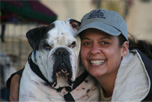 Can Cats Cause Schizophrenia?
Can Cats Cause Schizophrenia?
As if parents of young children didn't have enough things to worry about, here's another. Some scientists think pet cats might increase a child's risk of developing schizophrenia. But there's good news out of this growing field of research, which focuses on the links between a cat-borne parasite that causes toxoplasmosis and mental health disorders. A new study of about 5,000 children in the United Kingdom found no evidence that cat ownership during gestation or childhood was associated with psychotic experiences that can be early signs of mental illness, such as hallucinations or paranoia, when they were teenagers. However, the study's authors write there's good evidence that T. gondii infections (which cause toxoplasmosis) are associated with psychosis. Some researchers are now hypothesizing that owning cats in childhood increases the risk of developing mental illnesses, particularly schizophrenia and a handful of studies have supported this idea. But, they note that people can also become infected with T. gondii from undercooked meat or contaminated water. This new study is much larger than previous studies and it's based on data collected from children born in the early 1990s and tracked for decades. What the new research doesn't answer is whether cat ownership during pregnancy and childhood is linked to schizophrenia later in life, because the participants haven't yet reached the age of onset of that disorder, which typically develops between 18 and 25. The researchers added that if there were a cat-mental illness connection, the early signs would be detectable when the participants were screened for psychotic experiences at ages 13 and 18. However, they warn pregnant women should continue to avoid the litter box, because T. gondii infections can cause serious birth defects and complications. At the end of the study, the authors added an unusual conflict-of-interest statement - they all own or have owned cats, but that did not affect their work.
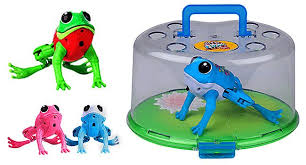 Moose Toys Recalled
Moose Toys Recalled
The US Consumer Product Safety Commission says Moose Toys Ltd. has issued a voluntary recall of more than 400,000 Little Live Pets Lil Frog plastic toys because of a battery hazard, which may cause injury due to the chemicals in the batteries. If the cap on the batteries is removed, it can become a projectile and the chemicals can leak. The company has received 17 reports of battery-related injuries. Of those, two injuries resulted in emergency room and doctor visits for eye irritation from battery chemicals. Only the Little Live Pets Lil Frog and the Lil Frog Lily Pad, sold in pink, blue and green, are being recalled. They were sold at military exchanges, Target, Toys "R" Us, Wal-Mart and Amazon.com from August through February. Consumers should look for a manufacture date beneath the product SKU on the frog's lower belly. The recalled products have date codes between WS112016 and WS123216. 1-844-575-0340 or recallenquiry@moosetoys.com.
 Unusual Things Confiscated by Airline Customs
Unusual Things Confiscated by Airline Customs
You can only imagine some of the incredibly unusual things that U.S. Customs and Border Protection agents have confiscated at Washington Dulles International Airport, now they can add horse genitals to that list. Recently, the CBP at the airport confiscated 42 pounds of horse meat, including 13 pounds of horse genitals from two women who had flown into the U.S. from Mongolia. During a routine questioning and search for agricultural items, CBP specialists found the horse meat, which was hidden inside juice boxes along 3 liters of yak milk. One woman said the meat was for medicinal purposes. Authorities say people often travel with food products that are normal to their culture but are not allowed in the U.S., unless it is certified by the country it came from and horse meat from Mongolia is specifically prohibited because of concerns of exposing diseases to U.S. livestock.
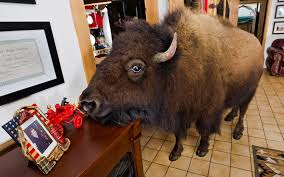 As The Saying Goes, Everything Is Bigger In Texas!
As The Saying Goes, Everything Is Bigger In Texas!
Only in Texas would you walk into someone's home and be greeted by a 2,500 pound family pet buffalo named Wild Thing. He's been living in his human parents house since he was a three-month-old calf and is treated just like he's a member of the family. Ronnie and Sherron Bridges even gave Wild Thing his own bedroom, where they say he likes to watch cartoons. They also let him eat at their dining room table and are OK with him wandering in and out of the house whenever he pleases. The Bridges say, "It's like having a small car in the house." Although Wild Thing does his best not to damage his parents' home, Dad Ronnie admits that there have been a few close calls when something spooked him and he accidentally ran off, picking him up with his horns, running around with him holding on.
 Dog Shoots Sleeping Girlfriend
Dog Shoots Sleeping Girlfriend
A man who claims his girlfriend was shot while she was sleeping is blaming the dog! Brian Murphy says his partner was shot in the leg after their dog Diesel leaped on the nightstand where he keeps his gun and accidentally set it off. He told Jacksonville, Florida Police that the dog woke him up that night so he decided to take him for a nighttime walk. When they returned, Diesel ran ahead of him into the couple's dark bedroom where his girlfriend was soundly sleeping. He then saw a flash accompanied by a loud bang and realized the girlfriend was injured. She is expected to make a full recovery.
Fake Service Animals Might Be A Crime
Misrepresenting a pet as a service animal may become a crime in Wyoming under a bill being considered in the state Legislature. The issue stems from people claiming their pet is a service animal in order to bring it into a place like a restaurant, store or rental property that doesn't allow pets.
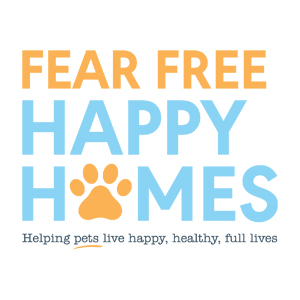
NEWS UPDATE brought to you by Fear Free. "Take the 'pet' out of 'petrified'" and get pets back for veterinary visits by promoting considerate approach and gentle control techniques used in calming environments.
 Listen to the entire Podcast of this show (#901)
Listen to the entire Podcast of this show (#901)



 Spring is finally here, but the bad news is that so are allergies for our dogs. But, there's good news in that there are two new medicines to help.
Spring is finally here, but the bad news is that so are allergies for our dogs. But, there's good news in that there are two new medicines to help. The other new product is Cytopoint. Cytopoint targets the specific protein that induces itching in a dog and gets rid of it also with no side affects. Cytopoint is an injectable that lasts 4 to 8 weeks, but some dogs can go even longer than that.
The other new product is Cytopoint. Cytopoint targets the specific protein that induces itching in a dog and gets rid of it also with no side affects. Cytopoint is an injectable that lasts 4 to 8 weeks, but some dogs can go even longer than that. Sanjay Gupta is our guest this week. He says he learned more from his dog than he did during 25 years of Philosophy education. His dog's insights clarify what really is important in life. Sanjay will share the most poignant message his Basset Hound taught him.
Sanjay Gupta is our guest this week. He says he learned more from his dog than he did during 25 years of Philosophy education. His dog's insights clarify what really is important in life. Sanjay will share the most poignant message his Basset Hound taught him. One of the things Sanjay tried to remind himself of was the fact that he can't pretend to know what goes on in other people's heads, but when he looks at Cody, he would love to know what he is thinking about. It's a really arrogant presumption for Sanjay to think that a human being could possibly know what God's creature is thinking.
One of the things Sanjay tried to remind himself of was the fact that he can't pretend to know what goes on in other people's heads, but when he looks at Cody, he would love to know what he is thinking about. It's a really arrogant presumption for Sanjay to think that a human being could possibly know what God's creature is thinking. What dog owner hasn't heard that frightening sound that dogs make- part cough, part sneeze and often described as a dog being unable to catch his breath. But it really isn't asthma, or some kind of bone stuck in your dog's throat - it's a reverse sneeze. So before you panic and run into the veterinary office on emergency, ensure you know what a reverse sneeze is.
What dog owner hasn't heard that frightening sound that dogs make- part cough, part sneeze and often described as a dog being unable to catch his breath. But it really isn't asthma, or some kind of bone stuck in your dog's throat - it's a reverse sneeze. So before you panic and run into the veterinary office on emergency, ensure you know what a reverse sneeze is.  -Vibrational coughing/wheezing sound
-Vibrational coughing/wheezing sound
 There comes a time when all of us have to deal with the tough decision of who do I trust to watch my beloved pets? Maybe it's a family member, a neighbor, a pet sitter that was recommended or someone else. To help celebrate Professional Pet Sitters, and more importantly help all of our Animal Radio family, I thought I'd get your started with this truly critical task.
There comes a time when all of us have to deal with the tough decision of who do I trust to watch my beloved pets? Maybe it's a family member, a neighbor, a pet sitter that was recommended or someone else. To help celebrate Professional Pet Sitters, and more importantly help all of our Animal Radio family, I thought I'd get your started with this truly critical task. Can Cats Cause Schizophrenia?
Can Cats Cause Schizophrenia?
 As The Saying Goes, Everything Is Bigger In Texas!
As The Saying Goes, Everything Is Bigger In Texas!
 Dog Shoots Sleeping Girlfriend
Dog Shoots Sleeping Girlfriend
